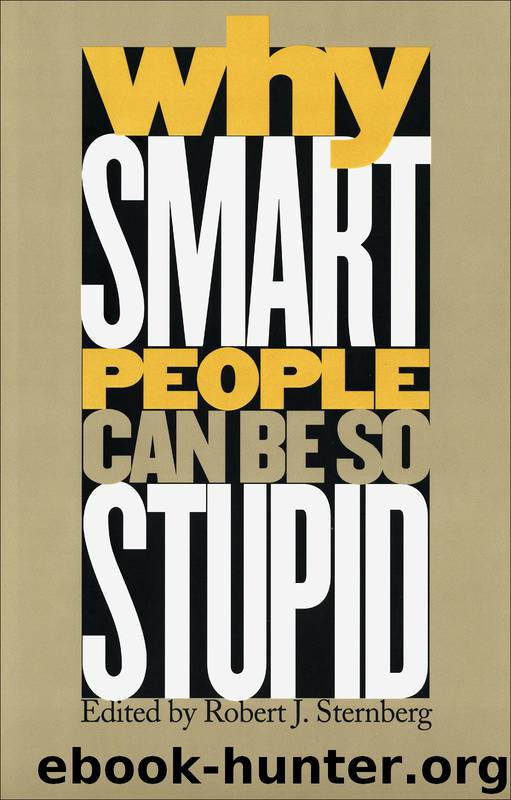Why Smart People Can Be So Stupid by Robert J. Sternberg

Author:Robert J. Sternberg
Language: eng
Format: epub
Publisher: Yale University Press
Published: 2002-03-18T16:00:00+00:00
Thinking Dispositions, Cognitive Capacities, and Levels of Analysis
In many areas of psychology, increasing attention is being paid to behavioral/cognitive concepts that reside at the borderline of cognitive psychology and personality (Ackerman & Heggestad 1997; Goff & Ackerman 1992; Haslam & Baron 1994; Keating 1990; Nickerson 1988; Perkins 1995; Perkins, Jay, & Tishman 1993; Rolfhus & Ackerman 1999; Siegel 1993; Stanovich & West 1997; Sternberg 1997b; Sternberg & Ruzgis 1994; Swartz & Perkins 1989). Moshman (1994), for instance, reminds us of the importance of “considerations of will and disposition [because they] lie at the interface of cognition with affect, motivation, social relations, and cultural context” (p. 143), and Sternberg (1988) likewise notes that “intellectual styles represent an important link between intelligence and personality, because they probably represent, in part, a way in which personality is manifested in intelligent thought and action” (p. 218). Terminology surrounding such notions is remarkably varied. The term “thinking dispositions” is used in this chapter (see Baron 1988; Ennis 1987; Perkins 1995; Stanovich & West 1997), although other theorists—in dealing with similar concepts—prefer terms such as intellectual style (Sternberg 1988, 1989), cognitive emotions (Scheffler 1991), habits of mind (Keating 1990), inferential propensities (Kitcher 1993, pp. 65–72), epistemic motivations (Kruglanski 1990), constructive meta-reasoning (Moshman 1994), styles of epistemic regulation (Sá, West, & Stanovich 1999; Stanovich 1999); cognitive styles (Messick 1984, 1994), and thinking styles (Sternberg 1997b). Despite this diversity of terminology, most authors use such terms similarly—to refer to relatively stable psychological mechanisms and strategies that tend to generate characteristic behavioral tendencies and tactics (see Buss 1991).
In this chapter, it is proposed that thinking dispositions should be distinguished from cognitive capacities because the two constructs are at different levels of analysis in cognitive theory and do separate explanatory work. This distinction motivates interest in a consistent empirical finding in the literature—that thinking dispositions can predict performance on reasoning and rational thinking tasks even after individual differences in measures of general cognitive ability have been partialled out.
The distinction between cognitive capacities and thinking dispositions has been drawn by many theorists (e.g., Baron 1985, 1988, 1993b; Ennis 1987; Moshman 1994; Norris 1992; Perkins et al. 1993; Schrag 1988). For example, in Baron’s conceptualization (1985, 1988), capacities refer to the types of cognitive processes studied by information processing researchers seeking the underlying cognitive basis of performance on IQ tests. Perceptual speed, discrimination accuracy, working memory capacity, and the efficiency of the retrieval of information stored in long-term memory are examples of cognitive capacities that underlie traditional psychometric intelligence and that have been extensively investigated (Ackerman, Kyllonen, & Richards 1999; Carpenter, Just, & Shell 1990; Deary & Stough 1996; Engle et al. 1999; Fry & Hale 1996; Hunt 1978, 1987; Lohman 1989; Sternberg 1982; Vernon 1991, 1993). These cognitive capacities are what Baltes (1987) terms the “mechanics of intelligence.” Psychometric g provides an overall index of the cognitive efficiency of a wide variety of such mechanisms in a given individual (Carroll 1993, 1997). According to Baron’s (1985) conception, cognitive capacities cannot be improved in the short term by admonition or instruction.
Download
This site does not store any files on its server. We only index and link to content provided by other sites. Please contact the content providers to delete copyright contents if any and email us, we'll remove relevant links or contents immediately.
The Art of Thinking Clearly by Rolf Dobelli(10414)
Mindhunter: Inside the FBI's Elite Serial Crime Unit by John E. Douglas & Mark Olshaker(9313)
Change Your Questions, Change Your Life by Marilee Adams(7733)
Nudge - Improving Decisions about Health, Wealth, and Happiness by Thaler Sunstein(7689)
Mastermind: How to Think Like Sherlock Holmes by Maria Konnikova(7313)
The Power of Now: A Guide to Spiritual Enlightenment by Eckhart Tolle(5744)
Men In Love by Nancy Friday(5231)
Altered Sensations by David Pantalony(5092)
Factfulness: Ten Reasons We're Wrong About the World – and Why Things Are Better Than You Think by Hans Rosling(4729)
The Confidence Code by Katty Kay(4248)
Thinking in Bets by Annie Duke(4216)
Man and His Symbols by Carl Gustav Jung(4125)
The Worm at the Core by Sheldon Solomon(3483)
Why Buddhism is True by Robert Wright(3446)
Liar's Poker by Michael Lewis(3440)
Three Women by Lisa Taddeo(3419)
The Inner Life of Animals by Peter Wohlleben(3303)
Descartes' Error by Antonio Damasio(3270)
How Music Works by David Byrne(3256)
